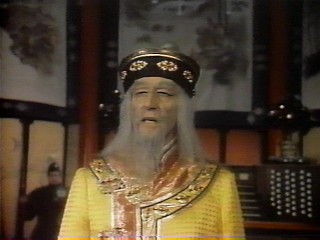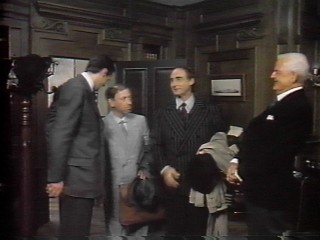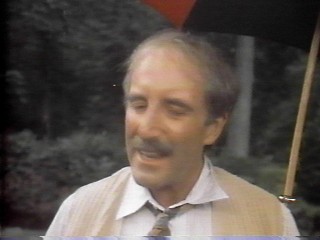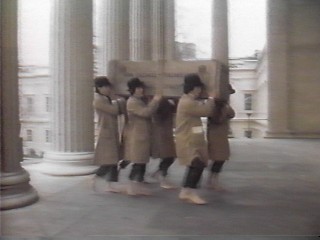
|
|
|
|
|
|
|
|
|
|
|
|
|
(1980) Director: Piers Haggard
Despite starring Peter Sellers, and it being his last movie, The Fiendish Plot Of Dr. Fu Manchu has largely been forgotten by both film historians and Sellers fans. After watching it, I can understand why people see Sellers' Being There as his final hurrah instead of this movie. It's an embarrassing way to end anybody's career, especially for someone as talented as him. The movie isn't just a waste of Sellers' talent and time, but a complete waste of time for everyone involved. More so, because the movie is not only terribly unfunny, but it has a premise that is not only ill-conceived but ineptly executed. As well, when seen today in this more sensitive era, it's racist to boot. I have never read any of Sax Rohmer's original stories,
and of the previous movie adaptations of his characters in the series,
I've only seen one of the Christopher Lee movies. So I can't say that
I'm It's here that I start to have a problem with the whole premise. It's not that I object to Fu Manchu happening to be Asian and that Nayland Smith is from the west - it's the premise's attitude to this setup. That is, that the attitude is that Fu Manchu is a symbol for the so-called "yellow peril" that threatened to cruelly crush the west, and Nayland Smith symbolizes good and virtue, since he is white. True, the stories were written in less sensitive times, but that doesn't make them forgivable. As I said, I'm not an expert on Fu Manchu and I can't say for sure that this is indeed the attitude in the books, but from my limited experience with Fu Manchu during my lifetime, this is how the attitude seems to be. So what The Fiendish Plot Of Dr. Fu Manchu promises
to be is a spoof of something that is tinged with a kind of subtle
racism.
That isn't exactly promising, though I I think I've attacked the movie's racism enough now, so I'll now move into the second big objection I had with the movie's setup. Although the movie claims to be a (comic) Fu Manchu movie, it really isn't. Oh yes, there is a character named Fu Manchu, and we see he has a nemesis named Nayland Smith. But they aren't the characters we know. The Fu Manchu here isn't concocting a deadly plague or a big ray gun. This Fu Manchu is a feeble 168 year-old who has run out of youth elixir, and has to gather two important diamonds and a mummy in order to make up another batch. (And no, we don't find out how it's possible for these items to be used to make the elixir.) Sellers, in heavy makeup, plays Fu Manchu as slightly goofy - a tragic mistake. It's simply not funny to see Fu Manchu doing things like electrocuting himself time after time to prolong his life until he gets the elixir. Even for a comedy, it strains credibility that someone not so smart could be in a position of power. The only way it could possibly be played is straight, possibly like Vincent Price played the amusing mad scientist Dr. Goldfoot in those two movies. Sellers also plays Nayland Smith, and plays it just as
weakly as Fu Manchu. His Nayland Smith has gone somewhat batty after he
was captured and tortured by Fu Manchu's minions years earlier. This
could
have worked, but there is no sign of the real Nayland Smith I hope Sellers did this movie for the money, since it's really embarrassing to see him muttering both of these characters (sometimes so badly, you can't make out what he's saying) and doing such unfunny shtick. At least he doesn't come off any worse than anyone else in the cast; his co-stars Helen Mirren and Sid Caesar are pretty awful, though they don't get much chance to be funny. In fact, they don't get much to do anything, since they only appear sporadically, and engage in short bits of dialogue that are not only unfunny, but come off like they were improvised. When you start to think about the foolishness of going to the expense of hiring stars if you are not going to use them that much, as well as some of the unexplained moments in the movie (such as that business with the elixir), I can only conclude that the movie was originally shot to be at a much longer length, then encountered some problems in the editing room. At the same time, the improvised-like dialogue isn't the
only thing that gives you the impression that they were making things
up
as they went along. Certainly, there is the awful and way out of left
field
ending, but there are many other scenes that come across as pointless.
For example, one of Fu Manchu's henchmen attempts to I can't say, in fairness, that the movie is thoroughly inept in every area. The production design is quite nice, depicting the early 1930s quite convincingly. The first ten minutes also provide some entertainment, including spectacular gymnastic and kung-fu choreography played during the credits, and a few smiles during the opening scene (including an amusing in-joke to fans of The Pink Panther series.) Maybe later on there were a few other smiles here and there, but by then I was too embarrassed to find anything else amusing in this movie - embarrassed not just because of its depiction of Asians, but embarrassed that people had put so much time and effort into something that was such a waste of time. UPDATE: Rori Stevens sent this trivia: "Hi there! I recently read an excellent biography of
Peter Sellers, "Mr.
Strangelove" by Ed Sikov, and with a little help from IMDB there
were some interesting details regarding this film I thought would be
worth
Check for availability on Amazon (VHS) See also: Night Patrol, Oddball Hall, Renegade |
 very knowledgeable about Fu Manchu, nor can I
confidently say for sure
just how much this movie accurately reproduces the elements from the
books.
I think I can safely say that combined with what I already knew, along
with some quick outside research, that I know the bare bones of the Fu
Manchu world; that Fu Manchu is some Asian super criminal bent on
conquering
the world, and detective Nayland Smith keeps battling and spoiling
Manchu's
formidable plans.
very knowledgeable about Fu Manchu, nor can I
confidently say for sure
just how much this movie accurately reproduces the elements from the
books.
I think I can safely say that combined with what I already knew, along
with some quick outside research, that I know the bare bones of the Fu
Manchu world; that Fu Manchu is some Asian super criminal bent on
conquering
the world, and detective Nayland Smith keeps battling and spoiling
Manchu's
formidable plans.
 suppose it could be
feasible - a
parody of Fu Manchu that managed to savagely attack and satirize the
racist
elements could be insightful as well as funny. I guess that even a
parody
that doesn't do that - like this movie - could be funny, as long as
they
removed the subtle racism. This movie doesn't do that. In fact, it
brings
in extra offensiveness, such as Asian characters named Chow Mein and
Won
Ton, or thinking that Sid Caesar's character repeating the slur "Chink"
is hilarious. The movie bringing in such old ways to offend shows its
desperateness,
as well as its racism.
suppose it could be
feasible - a
parody of Fu Manchu that managed to savagely attack and satirize the
racist
elements could be insightful as well as funny. I guess that even a
parody
that doesn't do that - like this movie - could be funny, as long as
they
removed the subtle racism. This movie doesn't do that. In fact, it
brings
in extra offensiveness, such as Asian characters named Chow Mein and
Won
Ton, or thinking that Sid Caesar's character repeating the slur "Chink"
is hilarious. The movie bringing in such old ways to offend shows its
desperateness,
as well as its racism.
 in this character
- here, he's just a tired and sickly old man who mutters and pronounces
words with long pauses between them. Also, he keeps pushing around a
lawn
mower wherever he goes, long past the point where the gag has already
beaten
to death. He's instead just a tired old man who just comes up with
deductions
when the script dictates it. He and Fu Manchu are so unlike their
original
characters - even when considering this is a comedy - you have to
wonder
why producer Hugh Hefner even bothered to label this a Fu Manchu movie
when a couple of simple name changes could have made this a
different
story entirely.
in this character
- here, he's just a tired and sickly old man who mutters and pronounces
words with long pauses between them. Also, he keeps pushing around a
lawn
mower wherever he goes, long past the point where the gag has already
beaten
to death. He's instead just a tired old man who just comes up with
deductions
when the script dictates it. He and Fu Manchu are so unlike their
original
characters - even when considering this is a comedy - you have to
wonder
why producer Hugh Hefner even bothered to label this a Fu Manchu movie
when a couple of simple name changes could have made this a
different
story entirely.
 use a mechanical
spider
to steal one of the diamonds from a museum, but the spider fails so
badly,
then henchman has to sneak to the display case and steal the diamond
himself.
It may sound funny, but it comes across as absolute padding, and the
joke
of the idea - going to all that trouble when he could have easily done
it without assistance - is completely lost. There are other subplots
(such
as Fu Manchu falling in love, and his various attempts to get the
second
diamond) that go nowhere. It soon becomes clear that there is barely
any
story, since all Fu Manchu has to do is get the three ingredients and
that's
that. So the movie relies on essentially useless subplots to stretch
things
out to the breaking point.
use a mechanical
spider
to steal one of the diamonds from a museum, but the spider fails so
badly,
then henchman has to sneak to the display case and steal the diamond
himself.
It may sound funny, but it comes across as absolute padding, and the
joke
of the idea - going to all that trouble when he could have easily done
it without assistance - is completely lost. There are other subplots
(such
as Fu Manchu falling in love, and his various attempts to get the
second
diamond) that go nowhere. It soon becomes clear that there is barely
any
story, since all Fu Manchu has to do is get the three ingredients and
that's
that. So the movie relies on essentially useless subplots to stretch
things
out to the breaking point.